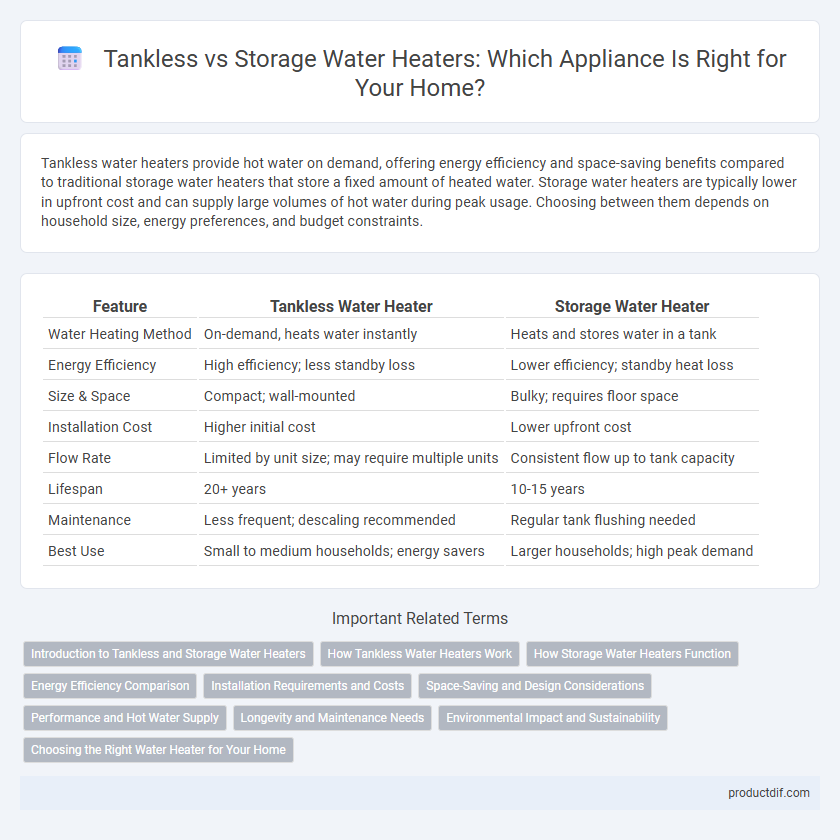Tankless water heaters provide hot water on demand, offering energy efficiency and space-saving benefits compared to traditional storage water heaters that store a fixed amount of heated water. Storage water heaters are typically lower in upfront cost and can supply large volumes of hot water during peak usage. Choosing between them depends on household size, energy preferences, and budget constraints.
Table of Comparison
| Feature | Tankless Water Heater | Storage Water Heater |
|---|---|---|
| Water Heating Method | On-demand, heats water instantly | Heats and stores water in a tank |
| Energy Efficiency | High efficiency; less standby loss | Lower efficiency; standby heat loss |
| Size & Space | Compact; wall-mounted | Bulky; requires floor space |
| Installation Cost | Higher initial cost | Lower upfront cost |
| Flow Rate | Limited by unit size; may require multiple units | Consistent flow up to tank capacity |
| Lifespan | 20+ years | 10-15 years |
| Maintenance | Less frequent; descaling recommended | Regular tank flushing needed |
| Best Use | Small to medium households; energy savers | Larger households; high peak demand |
Introduction to Tankless and Storage Water Heaters
Tankless water heaters provide hot water on demand by heating water directly without the use of a storage tank, resulting in energy savings and continuous supply. Storage water heaters store a fixed amount of heated water in an insulated tank, ready for immediate use but can suffer from standby heat loss. Choosing between tankless and storage water heaters depends on factors like household size, energy efficiency preferences, and installation space.
How Tankless Water Heaters Work
Tankless water heaters provide hot water on demand by heating cold water directly as it flows through the unit, eliminating the need for a storage tank. Electric coils or a gas burner rapidly heat the water, ensuring continuous supply without waiting for a tank to refill. This system offers increased energy efficiency and space-saving benefits compared to traditional storage water heaters.
How Storage Water Heaters Function
Storage water heaters function by heating a large tank of water using electric elements or a gas burner, maintaining a ready supply of hot water stored at a set temperature. When hot water is drawn, cold water enters the tank, triggering the heating mechanism to replenish the heated water. This continuous cycle ensures a steady flow of hot water, but storage tanks can lead to standby heat loss, affecting energy efficiency.
Energy Efficiency Comparison
Tankless water heaters typically offer higher energy efficiency by heating water on demand, reducing standby heat loss common in storage water heaters. Storage water heaters maintain a reservoir of hot water, which can lead to energy waste as heat dissipates over time. Choosing a tankless model can result in energy savings of 10-30% depending on usage patterns and household size.
Installation Requirements and Costs
Tankless water heaters require specialized installation with upgraded electrical or gas lines, often increasing upfront costs compared to traditional storage water heaters. Storage water heaters need more space for the tank and simpler plumbing, typically resulting in lower installation expenses. Long-term energy savings from tankless units can offset higher initial costs, but careful evaluation of installation requirements is essential for accurate budgeting.
Space-Saving and Design Considerations
Tankless water heaters offer a compact, wall-mounted design that significantly saves space compared to bulky storage water heaters, making them ideal for smaller homes or areas with limited utility space. Unlike traditional storage models that require a large tank for hot water storage, tankless units heat water on demand, eliminating the need for a separate storage area and enabling more flexible installation locations. This space-saving advantage also contributes to a cleaner, modern aesthetic in kitchen or utility room designs, allowing for streamlined appliance arrangements and enhanced room functionality.
Performance and Hot Water Supply
Tankless water heaters provide continuous hot water on demand, ensuring high performance by heating water only when needed and eliminating standby heat loss common in storage water heaters. Storage water heaters have a limited hot water capacity stored in a tank, which can be depleted during heavy usage, causing fluctuations in water temperature. Tankless models generally offer better energy efficiency and consistent temperature control, while storage water heaters may deliver a faster initial volume of hot water but risk running out during peak demand.
Longevity and Maintenance Needs
Tankless water heaters typically offer a longer lifespan of 20+ years compared to storage water heaters, which usually last around 10-15 years. Maintenance for tankless models involves periodic descaling to prevent mineral buildup, while storage units require regular flushing to remove sediment from the tank. Choosing a tankless heater can reduce long-term maintenance frequency and extend replacement intervals, enhancing overall appliance durability.
Environmental Impact and Sustainability
Tankless water heaters consume up to 30% less energy than traditional storage models by heating water directly on demand, reducing greenhouse gas emissions and energy waste. Storage water heaters maintain a reservoir, leading to standby heat loss and higher energy consumption, contributing to increased carbon footprint over time. Choosing tankless systems supports sustainability by lowering household energy use and minimizing environmental impact.
Choosing the Right Water Heater for Your Home
A tankless water heater provides hot water on demand, offering energy efficiency and space-saving benefits, ideal for homes with limited space and lower simultaneous water usage. Storage water heaters store a large volume of heated water, supplying consistent hot water to multiple fixtures simultaneously, making them suitable for larger households with higher hot water demand. Evaluating daily water consumption, available installation space, and energy efficiency preferences helps determine whether a tankless or storage water heater best suits your home's needs.
Tankless vs Storage Water Heater Infographic

 productdif.com
productdif.com